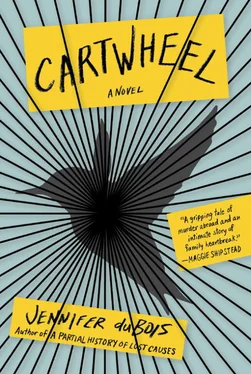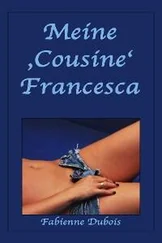It had been a long time since Sebastien had had a crush on an actual girl. He watched a lot of pornography, though he didn’t really like things quite so mechanized and denuded; there was something about the clinical insertions and withdrawals that always reminded him a bit of the dentist. He was aesthetically though not ethically opposed to prostitution. There were women at Pan y Vino, where he went to buy his toilet paper and cereal and shittiest wine (almost everything else was ordered from online gourmet shops, though he bought mostly condiments and liqueurs and actually, he realized, ate very little by modern standards). But those women were purely no-nonsense (how he longed for some nonsense!), and rough with him in a way that suggested vast reservoirs of matronly concern. They often stuck extra candies in his bag, as though he needed them. As though, really, he needed anything.
He could hardly believe it, then, the day that Lily showed up at his doorstep. Nobody ever came to his door anymore; even the Jehovah’s Witnesses were sick of him, having learned long ago that he’d do absolutely anything to detain them (he told himself that this was due to high-minded social experimentation, and not grave and crushing loneliness). So when Sebastien heard a knock at his door he initially thought he was hallucinating. But then it came again—stubborn and, he thought, just the tiniest bit harassed. He could still hope for a snake-oil salesman, he supposed; he could hope for some scam designed to bleed him dry on behalf of a fictional broken-down child or old person or car. He was up for it, he thought, as he walked to the door. He was up for anything. He peered out through the huge, baroque keyhole. There, framed by its jagged silhouette, was the unmistakable Lily Hayes from next door, her face like the sunny pistil in some strange-petaled flower. Sebastien opened the door.
“Hi,” she said, extending her hand. “I’m Lily. I’m staying next door with the Carrizos, and I’m supposed to invite you over for dinner.”
“Are you?” he said. “Well, go ahead then.”
As it happened, he had no other plans. The night of the dinner, he was ready by six-thirty, wilting in his suit, one of his father’s better clarets—a 1996 Château Lafite Rothschild Pauillac—liberated from the cellar and cradled in his arms like a doll. At seven of seven he began the walk across the yard and down to the Carrizos’, taking stock for the first time in a long time of what his house might look like through the eyes of another person. The weeds were scabby and tall and vaguely lethal looking. He should get them taken care of, he knew; he had no excuse not to; he could certainly afford it. Why had he never bothered? Maybe he’d liked the idea of the weeds conveying some kind of desperation and disorder within; maybe, he realized with a flicker of self-disgust, they were meant to be a kind of cry for help. He comforted himself briefly with the thought that nobody would notice such a gesture, even if he were inclined to make one. But then he looked at the well-lit house at the end of the path, and he wondered grimly if perhaps somebody already had.
He reached the Carrizos’ porch at 6:56, then had to decide whether it was worse to be early or to stand creepily on the porch for no reason. After a moment or two of what he hoped was semi-plausible fiddling with his hair and tie, he rang the doorbell. It was 6:57.
Beatriz Carrizo appeared at the door, her décolletage glimmering with tan and sweat and good health, her black hair pulled back into a heavy braid. “Oh! Hello!” she said. She sounded surprised, although he did not know why she would be surprised. “You must be Sebastien!”
His initial reaction— Must I be? —ran through his head, before he reminded himself to try, really try, not to be maddening.
“Guilty as charged, I’m afraid.” He flashed a smile that he hoped was winning. He’d been thought winning once, in some misty past—he’d been considered precocious, and charming, and all the young female teachers at Andover had touched their hair a lot when they called on him in class. But those days were over, and now he could only meekly hope that he was vaguely fit for the company of normal people. “You must be Señora Carrizo,” he said.
She smiled warmly. “Come in.”
In the modern light of the well-appointed kitchen, Sebastien felt ridiculous. Around him, the monstrous refrigerator buzzed and all the surfaces gleamed brutally white. Everything was new and shiny and unobtrusive, and Sebastien was ancient and absurd. Why had he worn a suit? He looked like he was dressed for a costume party.
Panicked, Sebastien handed Beatriz the wine. “I brought this,” he said. It was far too expensive, of course, and the wrong thing entirely, and Sebastien was struck by the realization, like a physical convulsion, that the evening was going to go very badly.
“I’ll open it,” said Beatriz, getting a corkscrew. Sebastien wanted to tell her she didn’t have to open it now—that she could save it for a better and worthier occasion—but that seemed potentially obnoxious, and Sebastien only liked being obnoxious deliberately. Mercifully, it was clear that Beatriz had no idea how expensive the wine was; she opened it and spilled a little on the linoleum and poured five glasses and took a sip of hers without even letting it breathe. Sebastien was relieved that this particular mistake of his had not been noticed. Others certainly would be. He was far too warm in his suit, and he began to feel feverish and anxious. He tried to remember the last time he’d worn it. It must have been in his final year of Andover, not long before the plane crash, when he was visiting Boston for an accepted students’ dinner at Harvard. He remembered being hot in it then, too—it had been unseasonably warm for May in New England, and the subways were coughing up that particular smell of theirs, that strange blend of steam and chalk—but there’d also been a lightness all around him, and a sense of life unfolding satisfyingly along its intended trajectory. Now, in Beatriz Carrizo’s terrifyingly clean kitchen, Sebastien almost thought that if he buried his head into his overdressed arm he might smell Boston, and his father’s borrowed cologne, and his own youthful sweat, full of frightened happiness.
Beatriz was looking at him with concern. “Are you all right?” she said.
He flashed another diamond smile. “I simply could not fathom being any better.”
“Would you like to sit down?” said Beatriz.
Sebastien swallowed. “Sitting down is one of my favorite things to do, if you can believe it.”
In the dining room, Lily was already at the table and Sebastien gave her a courtly, overstated nod. She was pale in the bluish wash of the evening light; her dark eyebrows were slender isthmuses against the milky sea of her forehead. Next to her sat Katy Kellers: beech-colored hair; marble, nearly kaleidoscopic eyes; small, symmetrical features etched with what seemed like obsessive fineness. Lily watched Sebastien watching Katy and gave him an appraising look.
“You made it,” she said flatly, and shot him a dubious smile that somehow employed exactly one-half of her mouth. Her eyebrows, it seemed, were eternally convex, giving her an expectant sort of look that could seem intelligent or erotic—or both, Sebastien figured—depending on your prejudices.
“Last-minute cancellation,” he said. “Though the commute was atrocious.” Sebastien waited to be introduced to Katy. When nobody ventured to do this, he introduced himself.
“Hello,” he said, reaching his hand across the table and being careful not to disturb the butter dish. “I don’t believe we’ve met.”
Katy nodded. “Katy Kellers,” she said. Sebastien wasn’t used to women who said only their names by way of introduction—but then, he reminded himself, he wasn’t used to women in general, or people in general, for that matter, anymore.
Читать дальше












